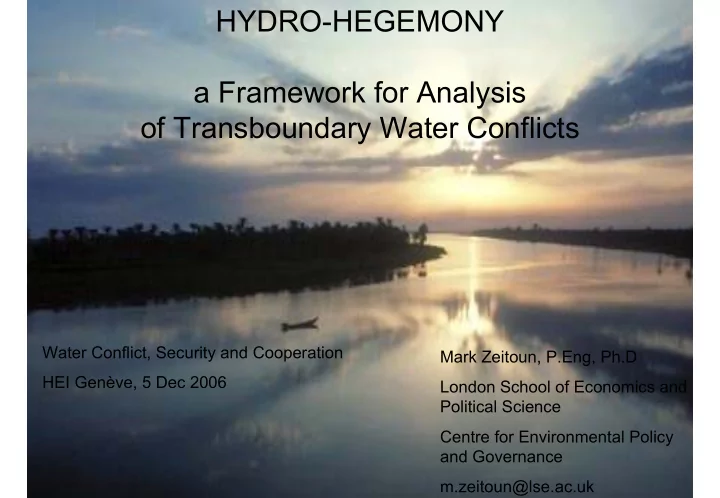

HYDRO-HEGEMONY a Framework for Analysis of Transboundary Water Conflicts Water Conflict, Security and Cooperation Mark Zeitoun, P.Eng, Ph.D HEI Genève, 5 Dec 2006 London School of Economics and Political Science Centre for Environmental Policy and Governance m.zeitoun@lse.ac.uk
“without a good water conflict theory, we are doomed to myopia - no matter how insightful the occasional analysis” (Frey and Naff, 1985). (incomplete) list of theory relevant to Transboundary Water Frey and Naff Power/Interests/Position Matrix (1985) Lowi Theory of Hegemonic Cooperation (1993) Homer-Dixon + Environmental Determinism (1996, 1999) Allan Virtual water (2001) Gleick Water as a means / tool / target of conflict (2001+) Wolf + Water Conflict Prevention, Water Dispute Database Turton + Hydropolitical Complex Theory / Securitisation (2002) Allouche Hydro-Nationalism (2005)
restricted sovereignty value of water ideology virtual water benefit-sharing transboundary regimes river-basin riparian position Water Law catchment area politics POWER
How Important is… Riparian Position? Catchment Area? Law or Treaties?
How Important is… Riparian Position? Catchment Area? POWER Law or Treaties?
FRAMEWORK OF HYDRO-HEGEMONY considers two features: A.Intensities of Conflict and Cooperation � The absence of war does not mean the absence of conflict � Existence of a treaty does not mean cooperation B.Influence of Power � Power determines the outcome of the conflict, its intensity, and its nature � Power is the reason water conflicts linger unresolved
A. Intensity of Conflict The absence of war does not mean the absence of conflict (building on Yoffe et. al.)
Scale Event Description 7 Voluntary Unification into one nation 6 Major Strategic Alliance (International Freshwater Treaty) Military, Economic or Strategic Support 5 Non-military Economic, Technological or Industrial Agreement 4 Cultural or Scientific Support (non-strategic) 3 Official Verbal Support of goals, values, or regime 2 Minor Official Exchanges, Talks or Policy Expressions 1 0 Neutral or non-significant acts for the inter-nation situation -1 Mild Verbal Expressions displaying discord in interaction -2 Strong Verbal Expressions displaying hostility in interaction Diplomatic-Economic Hostile Actions -3 Political-Military Hostile Actions -4 Small Scale Military Acts -5 Extensive War Acts causing deaths, dislocation or high strategic costs -6 Formal Declaration of War -7
A. (cont.) Qualifying Cooperation The existence of a treaty does not mean ‘cooperation’ (Wolf � Conca � Gleditsch � Kistin)
What is the utility of treaties on the Ganges? on the Jordan? Tigris? Is a ‘joint committee’ the same as ‘partnership’? What is the influence of a treaty over transboundary resource management? Is ‘cooperation’ even the goal? ( ☺ � � )
B. Influence of Power
Robert Prendergast
Ben Caird
Hamad al Falasi
Patricial Fenn
Warren Lee
Jasper Dagliesh
Allistair Starke
Andre Eichman
Benjamin Breer
Three Dimensions of Power Four levels of Hegemony I am talking of millions of men who have been skilfully injected with fear, inferiority complexes, trepidation, servility, abasement… Aimé Césaire Is it not the supreme exercise of power to get …others to have the desires you want them to have – that is, to secure their compliance by controlling their thoughts and desires ? Lukes
Multiple layers of hegemony (Warner) • Control of discourse, • Global level: institutions, rules • Territorial control, • Regional level identity • Basin level • Resource control • State level • Control of population, unity
Potential Interactions over transboundary waters : Methods of CONTROL:
Resisting Hegemony Some options available to ‘weaker’ states:
Abstract Model of Hegemony and Counter- -Hegemony Hegemony Abstract Model of Hegemony and Counter Ana Cascao ana.cascao@kcl.ac.uk Counter- -Hegemony Hegemony Counter Status quo - challenge Alternatives Contestation Break the consent POWER Asymmetries/ RELATION Inequity S Consent Sanctioned Discourse Co-option l a n r e t x p Status quo maintenance E u k c a b Hegemony Hegemony
ETHIOPIA Challenging Hegemony Inverted Triangle – How to challenge Hydro-Hegemony? Tactics Reactive and Active Diplomacy Desecuritisation Reinforced cooperation Financial mobilisation Political feasibility Knowledge/expertise construction Discourse alternatives Claim for legal principles Needs-approach Strategies Water infrastructures construction SH Economic and institutional development Social and political adaptive capacitie s SHARED CONTROL Goal Ana Cascao ana.cascao@kcl.ac.uk
CASE STUDY The Palestinian – Israeli Water Conflict
Steps taken to gain control over groundwater… 1967 Military Conquest � 3 military orders (resource capture strategy) 72% of West 1967–96 Occupation � dual development of West Bank Bank: min. for Palestinians, max. for settlers (resource capture strategy) 1996 “Oslo II” Agreement � “cementing facts on the ground” (containment strategy)
STRATEGIES and TACTICS used for Control of Transboundary Waters √
CONCLUSIONS OF CASE STUDY: a)Current utilistation is ‘inequitable’ and ‘unreasonable’ b)Conflict exists, even if it is hidden c)Intensity and outcome of conflict is determined in large part by power (not law or fair sharing) d)The situation of hegemony may be obscuring our analysis as much as it prevents resolution of the conflict. e)‘Domination dressed up as cooperation’ (Selby)
Summing-up the HH Analysis
• POWER (3 dimensions) has influence over: •Outcome •Analysis •Perception •Cooperative processes • Conflict and Cooperation exist simultaneously (but extent of each is determined by hegemon) • Cooperation must be qualified (existence of a treaty does not mean cooperation) • Conflicts linger unresolved
Policy Implications / Future Areas of Research: • Other Water Conflicts / Other Types of Water Conflict ( large n study…) • Towards Water ‘cooperation’: • International Water Law (levelling the playing field) • Unpacking ‘cooperation’ • Hydropolitical Complex Theory • Counter Hegemony / Resisting Hegemony Thank-you.
Recommend
More recommend